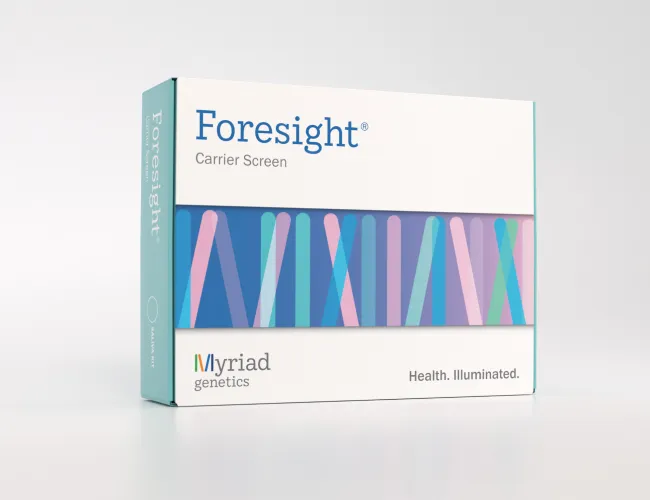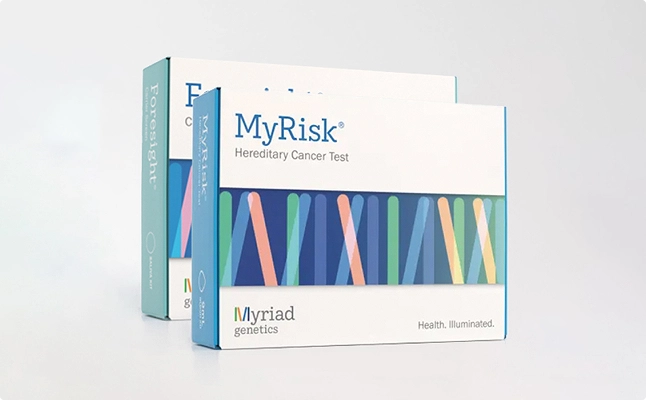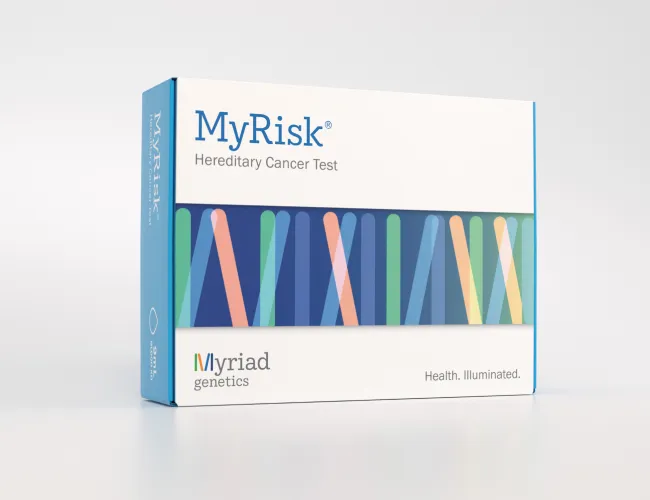
Clear cost estimates from Myriad Genetics
1. Self-pay: $49 due now. (and $249 will be billed to you from Myriad Genetics). Nothing is billed to insurance. A customer service representative from Myriad Genetics will call you to collect credit card payment after you ship your kit back with the prepaid shipping label.
2. Insurance: $49 due now, the rest is billed to your insurance. If you select to pay for your test through insurance, a few days after Myriad Genetics receives your saliva sample, they will contact you via email and/or text to let you know your cost estimate.
Your estimate will consider:
- Your insurance plan
- How much of your deductible has been paid so far this year
- Any copays or coinsurance per your plan
- Eligibility for financial assistance
You will receive an email/text from a representative from Myriad Genetics notifying you that your estimate is ready to view. Most people will pay $0, but if your estimate shows you’ll have an out-of-pocket cost that creates a hardship, you have options which will be provided to you.
Who should consider taking this test
The Reproductive Carrier Screen is intended for people who are planning to start or expand their family and wish to know if they are at an increased risk of having a child with a genetic condition.
How long will it take to get results?
Test results are provided in an easy to understand report available within 3 weeks of the sample arriving at the lab. If an individual or couple learns that they or their future children are at risk for a genetic disease, a genetic counselor will provide options for family planning or medical care.
Will genetic testing be covered by my insurance?
Your cost for screening depends on several factors, including your insurance plan and any copay or unmet deductible. More than 80% of individuals pay $0 out-of-pocket because their insurance companies cover carrier screening.
Once the lab receives your kit, you will be sent a personalized cost estimate letting you know what your insurance is likely to cover, what your additional out-of-pocket costs are expected to be, and what your options are.
If your insurance does not pay for testing, you do not meet your policy’s guidelines for testing, you are uninsured, or you have a high unmet deductible, you can forgo insurance and directly pay a self-pay price of $249 for your carrier screen. If you cannot afford testing, there are financial assistance programs available for those who qualify.
Expanded carrier screening is for those who are pregnant or planning to have a biological child in the future. This test is designed to assess an individual or couple’s risk for having a child with a genetic disease. The panel includes more than 260 diseases, such as Tay-Sachs disease, cystic fibrosis, and sickle cell disease.
Results are most informative when both partners are screened; each person must register separately.

After you complete your registration and your kit is ordered, Myriad Genetics will send you the kit to collect your saliva sample.

And receive your kit by mail.

Collect your saliva sample from the comfort of your home.

Receive your results within 3 weeks after mailing the kit with the prepaid shipping label.

Schedule your virtual genetic counseling session.
.webp)
Actionable
Test results are provided in an easy to understand report available within 3 weeks of the sample arriving at the lab. If an individual or couple learns that they or their future children are at risk for a genetic disease, a genetic counselor will provide options for family planning or medical care.
Affordable
jscreen is committed to helping you access reliable and affordable genetic testing. Carrier testing is covered by most insurance plans and Myriad Genetics offers the option of affordable cash pay prices and financial assistance programs for those who qualify.
Peace of Mind
If an action plan is needed, a care navigator will work with you on a plan that fits your needs. You can feel confident knowing that the carrier screen offered through the jscreen program, is the only validated carrier screening panel in the US backed by 20+ peer-reviewed publications and >1.6M patients screened.
Find answers to commonly asked questions about our genetic testing and services.
What types of diseases are included on the reproductive carrier screening panel offered through jscreen?
This test will tell you if you are a carrier of a genetic disease on the testing panel and your risk for having a child with that condition. See below to find out what it means to be a carrier and the type of conditions on the panel.
Carriers
Typically people who are carriers of diseases on this panel do not have symptoms. There are two types of diseases on this panel: recessive and X-linked diseases.
Recessive Diseases
Two carriers of the same recessive disease have a 25% (or 1 in 4) chance in each of their pregnancies that the baby will be affected with that disease. Carrier couples are counseled about their options to build a healthy family.
X-Linked Diseases
For female (sex assigned at birth) carriers of X-linked diseases, there is a chance of having an affected child regardless of her partner’s carrier status. Typically sons are more severely affected than daughters. It is recommended that all females have screening, regardless of their partner’s results. Individuals who are carriers of X-linked conditions are strongly advised to take advantage of the genetic counseling included with testing to discuss their results and reproductive options.
Learn more about Reproductive carrier screening with this short video.
When should I consider doing Reproductive carrier screening?
You should consider this test prior to starting or expanding your family. jscreen recommends updating testing prior to any pregnancy. If you or your partner are already pregnant, we recommend testing as soon as possible.
Will this test tell me if I have a genetic disease?
The panel is not designed to explain symptoms of an undiagnosed condition. However, there is a small chance that testing will indicate that you have or are at-risk for a medical condition, such as familial Mediterranean fever or Gaucher disease. If this happens, your genetic counselor will review this information and discuss appropriate follow-up care. If you are concerned about your personal health, we recommend that you speak with your health-care provider or a local genetic counselor.
What happens if I test positive for cancer screening?
If you learn you have a mutation in a cancer gene, there are many ways to maintain your health and to impact the health of your family. A genetic counselor will walk you through your results and options for next steps.
Depending on the results, options may include:
• Lifestyle modifications (for example: reduced alcohol consumption)
• Increased and/or more frequent cancer screening (for example: mammogram, colonoscopy, prostate exam, skin cancer screening)
• Preventative risk-reducing surgeries (for example: mastectomy, removal of ovaries after childbearing)
• Options to avoid passing down mutations to your future children (for example: in-vitro fertilization (IVF) with pre-implantation genetic testing, adoption)
If you test positive for a mutation, you’ll be able to inform your relatives, who may also be at-risk.
Is all cancer hereditary?
No. There are many factors that contribute to a person’s risk for developing cancer, including lifestyle, diet, environmental exposures, and chance. But some cancers are related to specific genetic changes that are inherited. For example, about 5-10% of breast cancers and about 20-25% of ovarian cancers are due to inherited genetic changes. A person may have an inherited change in a cancer gene even if cancer hasn’t occurred in their family. If you have specific questions related to your personal or family history of cancer, please contact a jscreen genetic counselor at genetic.counselor@jscreen.org.




